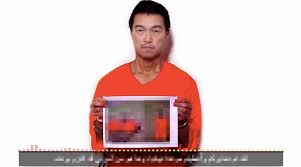
TOKYO — Japan’s prime minister said Sunday he was “speechless” after an online video purportedly showed that one of two Japanese hostages of the extremist Islamic State group had been killed, and he demanded the release of the other.
Shinzo Abe told Japanese broadcaster NHK that the video was likely authentic, though he said the government is still reviewing it. Abe offered condolences to the family and friends of Haruna Yukawa, a 42-year-old adventurer taken hostage in Syria last year.
He declined to comment on the message in the latest video, which demanded a prisoner exchange for the other hostage, journalist Kenji Goto. He said only that the government was still working on the situation, and reiterated that Japan condemns terrorism.
“I am left speechless,” he said, stressing he wants Goto released unharmed. “We strongly and totally criticize such acts.”
Yukawa’s father, Shoichi, said he hoped “deep in his heart” that the news of his son’s killing was not true.
“If I am ever reunited with him, I just want to give him a big hug,” he told a small group of journalists invited into his house.
President Barack Obama condemned what he called “the brutal murder” of Yukawa, saying in a statement that the United States stands by Japan and calling for Goto’s release.
The Associated Press could not verify the contents of the message, which varied greatly from previous videos released by the Islamic State group, which now holds a third of both Syria and Iraq.
The Islamic State group had threatened on Tuesday to behead the men within 72 hours unless it received a $200 million ransom. Kyodo News agency reported that Saturday’s video was emailed to Goto’s wife.
Patrick Ventrell, a spokesman for the White House National Security Council, said U.S. intelligence officials were also working to confirm whether it was authentic.
Abe said after a Cabinet meeting late Saturday that the government of Japan will not succumb to terrorism and will continue to cooperate with the international community in the fight against terrorism.
Japanese diplomats left Syria as the civil war there escalated, compounding the difficulty of reaching the militants holding the hostages.
Abe spoke by phone with Jordanian King Abdullah II on Saturday, the state-run Petra news agency reported, without elaborating on what they discussed. He also called the two hostages’ families.
Goto’s mother, Junko Ishido, told NHK that in the purported message her son “seemed to be taking seriously what may be happening to him as well.”
“I’m petrified,” Ishido said. “He has children. I’m praying he will return soon, and that’s all I want.”
But Ishido also was skeptical about the voice claiming to be Goto. “Kenji’s English is very good. He should sound more fluent,” she said.
Japanese government spokesman Yoshihide Suga said the audio was still being studied, but there was no reason to deny the authenticity of the video.
One militant on the Islamic State-affiliated website warned that Saturday’s new message was fake, while another said that the message was intended only to go to the Japanese journalist’s family.
A third militant on the website noted that the video was not issued by al-Furqan, which is one of the media arms of the Islamic State group and has issued past videos involving hostages and beheadings. Saturday’s message did not bear al-Furqan’s logo.
The militants on the website post comments using pseudonyms, so their identities could not be independently confirmed by the AP. However, their confusion over the video matched that of Japanese officials and outside observers.
Japanese officials have not directly said whether they are considering paying any ransom. Japan has joined other major industrial nations in opposing ransom payments. U.S. and British officials said they advised against paying.
Nobuo Kimoto, a business adviser to Yukawa, told NHK: “I was hoping he would be released, or at least that his life would not be taken.”
“I wish this was some kind of a mistake,” he said.
Yukawa was captured last summer, and Goto is thought to have been seized in late October after going to Syria to try to rescue him.
Associated Press writers Maamoun Youssef in Cairo, Mari Yamaguchi, Ken Moritsugu, Kaori Hitomi and Elaine Kurtenbach in Tokyo, and White House Correspondent Julie Pace at Ramstein Air Base, Germany contributed to this report.